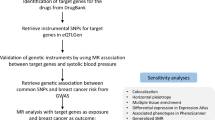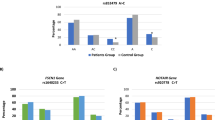Abstract
Background
Few studies have systematically explored a pathway approach: to test the association of multiple polymorphisms from multiple genes important to angiogenesis simultaneously with risk of breast cancer. We report our preliminary data evaluating the association of polymorphisms from seven genes known to influence angiogenesis with the likelihood of having breast cancer.
Methods
We recruited 715 controls and 520 subjects with breast cancer. Subjects provided a blood specimen and completed a questionnaire that included common breast cancer risk factors and breast cancer status. We evaluated candidate polymorphisms in the following genes: Hypoxia Inducible Factor-1 alpha (HIF1α), Vascular Endothelial Growth Factor (VEGF), VEGF Receptor 1 (VEGFR-1), VEGFR-2, endothelial Nitric Oxide Synthase (eNOS), Neuropilin-1 (NRP-1) and Neuropilin-2 (NRP-2). Testing for associations between each polymorphism and the presence or absence of breast cancer was performed.
Results
VEGF-2578 AA and -1498 CC genotypes were more common in cancer cases than controls (P = 0.06 and P = 0.04, respectively). These two genotypes remained significant predictors of breast cancer status after adjusting for non-genetic risk factors estimated by the Gail model (P = 0.03 and P = 0.03, respectively). When comparing women with invasive versus pre-invasive breast cancer, the eNOS-786 TT and eNOS 894 GG genotypes were associated with a greater likelihood of invasive disease and the eNOS 894 GG genotype was associated with a greater likelihood of having metastatic disease.
Conclusion
There is an association of the VEGF-2578A and -1498C alleles with increased breast cancer risk. This association remains significant when adjusted for Gail score-related risk factors.

Similar content being viewed by others
References
Folkman J (2001) Angiogenesis-dependent diseases. Semin Oncol 28:536–542
Folkman J (1985) Tumor angiogenesis. Adv Cancer Res 43:175–203
Folkman J (1995) Angiogenesis in cancer, vascular, rheumatoid and other disease. Nat Med 1:27–31
Plate KH, Breier G, Risau W (1994) Molecular mechanisms of developmental and tumor angiogenesis. Brain Pathol 4:207–218
Weinstat-Saslow D, Steeg PS (1994) Angiogenesis and colonization in the tumor metastatic process: basic and applied advances. FASEB J 8:401–407
Parangi S, O’Reilly M, Christofori G et al (1996) Antiangiogenic therapy of transgenic mice impairs de novo tumor growth. Proc Natl Acad Sci U S A 93:2002–2007
Schneider BP, Miller KD (2005) Angiogenesis of breast cancer. J Clin Oncol 23:1782–1790
Schneider BP, Sledge GW Jr (2007) Drug insight: VEGF as a therapeutic target for breast cancer. Nat Clin Pract Oncol 4:181–189
Guinebretiere JM, Le Monique G, Gavoille A et al (1994) Angiogenesis and risk of breast cancer in women with fibrocystic disease. J Natl Cancer Inst 86:635–636
Guidi AJ, Fischer L, Harris JR et al (1994) Microvessel density and distribution in ductal carcinoma in situ of the breast. J Natl Cancer Inst 86:614–619
Guidi AJ, Schnitt SJ, Fischer L et al (1997) Vascular permeability factor (vascular endothelial growth factor) expression and angiogenesis in patients with ductal carcinoma in situ of the breast. Cancer 80:1945–1953
Weidner N, Semple JP, Welch WR et al (1991) Tumor angiogenesis and metastasis–correlation in invasive breast carcinoma. N Engl J Med 324:1–8
Weidner N, Folkman J, Pozza F et al (1992) Tumor angiogenesis: a new significant and independent prognostic indicator in early-stage breast carcinoma. J Natl Cancer Inst 84:1875–1887
Schneider BP, Skaar TC, Sledge GW et al (2006) Analysis of angiogenesis genes from paraffin-embedded breast tumor and lymph nodes. Breast Cancer Res Treat 96:209–215
Lin CC, Wu HC, Tsai FJ et al (2003) Vascular endothelial growth factor gene-460 C/T polymorphism is a biomarker for prostate cancer. Urology 62:374–377
McCarron SL, Edwards S, Evans PR et al (2002) Influence of cytokine gene polymorphisms on the development of prostate cancer. Cancer Res 62:3369–3372
Krippl P, Langsenlehner U, Renner W et al (2003) A common 936 C/T gene polymorphism of vascular endothelial growth factor is associated with decreased breast cancer risk. Int J Cancer 106:468–471
Cheon KT, Choi KH, Lee HB et al (2000) Gene polymorphisms of endothelial nitric oxide synthase and angiotensin-converting enzyme in patients with lung cancer. Lung 178:351–360
Medeiros R, Morais A, Vasconcelos A et al (2002) Endothelial nitric oxide synthase gene polymorphisms and genetic susceptibility to prostate cancer. Eur J Cancer Prev 11:343–350
Iughetti P, Suzuki O, Godoi PH et al (2001) A polymorphism in endostatin, an angiogenesis inhibitor, predisposes for the development of prostatic adenocarcinoma. Cancer Res 61:7375–7378
Howell WM, Bateman AC, Turner SJ et al (2002) Influence of vascular endothelial growth factor single nucleotide polymorphisms on tumour development in cutaneous malignant melanoma. Genes Immun 3:229–232
Balasubramanian SP, Brown NJ, Reed MW (2002) Role of genetic polymorphisms in tumour angiogenesis. Br J Cancer 87:1057–1065
Ghilardi G, Biondi ML, Cecchini F et al (2003) Vascular invasion in human breast cancer is correlated to T→786C polymorphism of NOS3 gene. Nitric Oxide 9:118–122
Hefler LA, Ludwig E, Lampe D et al (2002) Polymorphisms of the endothelial nitric oxide synthase gene in ovarian cancer. Gynecol Oncol 86:134–137
Medeiros RM, Morais A, Vasconcelos A et al (2002) Outcome in prostate cancer: association with endothelial nitric oxide synthase Glu-Asp298 polymorphism at exon 7. Clin Cancer Res 8:3433–3437
Tanimoto K, Yoshiga K, Eguchi H et al (2003) Hypoxia-inducible factor-1alpha polymorphisms associated with enhanced transactivation capacity, implying clinical significance. Carcinogenesis 24:1779–1783
Jacobs EJ, Feigelson HS, Bain EB et al (2006) Polymorphisms in the vascular endothelial growth factor gene and breast cancer in the cancer prevention study II cohort. Breast Cancer Res 8:R22
Jin Q, Hemminki K, Enquist K et al (2005) Vascular endothelial growth factor polymorphisms in relation to breast cancer development and prognosis. Clin Cancer Res 11:3647–3653
Langsenlehner U, Wolf G, Langsenlehner T et al (2007) Genetic polymorphisms in the vascular endothelial growth factor gene and breast cancer risk. The Austrian “tumor of breast tissue: incidence, genetics, and environmental risk factors” study. Breast Cancer Res Treat, doi:10.1007/s10549-007-9655-z
Lu J, Wei Q, Bondy ML et al (2006) Promoter polymorphism (-786t>C) in the endothelial nitric oxide synthase gene is associated with risk of sporadic breast cancer in non-Hispanic white women age younger than 55 years. Cancer 107:2245–2253
Choi JY, Lee KM, Noh DY et al (2006) Genetic polymorphisms of eNOS, hormone receptor status, and survival of breast cancer. Breast Cancer Res Treat 100:213–218
Lemler S, Rufenbarger C, Skaar T et al (2005) Creating a DNA bank for pharmacogenomic epidemiology: the Friends for Life study. Breast Cancer Res Treat 94:S153 (Abstract #3084)
Costantino JP, Gail MH, Pee D et al (1999) Validation studies for models projecting the risk of invasive and total breast cancer incidence. J Natl Cancer Inst 91:1541–1548
Gail MH, Brinton LA, Byar DP et al (1989) Projecting individualized probabilities of developing breast cancer for white females who are being examined annually. J Natl Cancer Inst 81:1879–1886
Barrett JC, Fry B, Maller J et al (2005) Haploview: analysis and visualization of LD and haplotype maps. Bioinformatics 21:263–265
Stevens A, Soden J, Brenchley PE et al (2003) Haplotype analysis of the polymorphic human vascular endothelial growth factor gene promoter. Cancer Res 63:812–816
Cuzick J, Powles T, Veronesi U et al (2003) Overview of the main outcomes in breast-cancer prevention trials. Lancet 361:296–300
Acknowledgements
This work was supported by ASCO Career Development Award, Breast Cancer Research Foundation, Catherine Peachey Fund, GCRC CReFF Award & Indiana University Simon Cancer Center.
Author information
Authors and Affiliations
Corresponding author
Additional information
On Behalf of the “Friends for Life” Consortium.
Electronic supplementary material
Below is the link to the electronic supplementary material.
Rights and permissions
About this article
Cite this article
Schneider, B.P., Radovich, M., Sledge, G.W. et al. Association of polymorphisms of angiogenesis genes with breast cancer. Breast Cancer Res Treat 111, 157–163 (2008). https://doi.org/10.1007/s10549-007-9755-9
Received:
Accepted:
Published:
Issue Date:
DOI: https://doi.org/10.1007/s10549-007-9755-9




